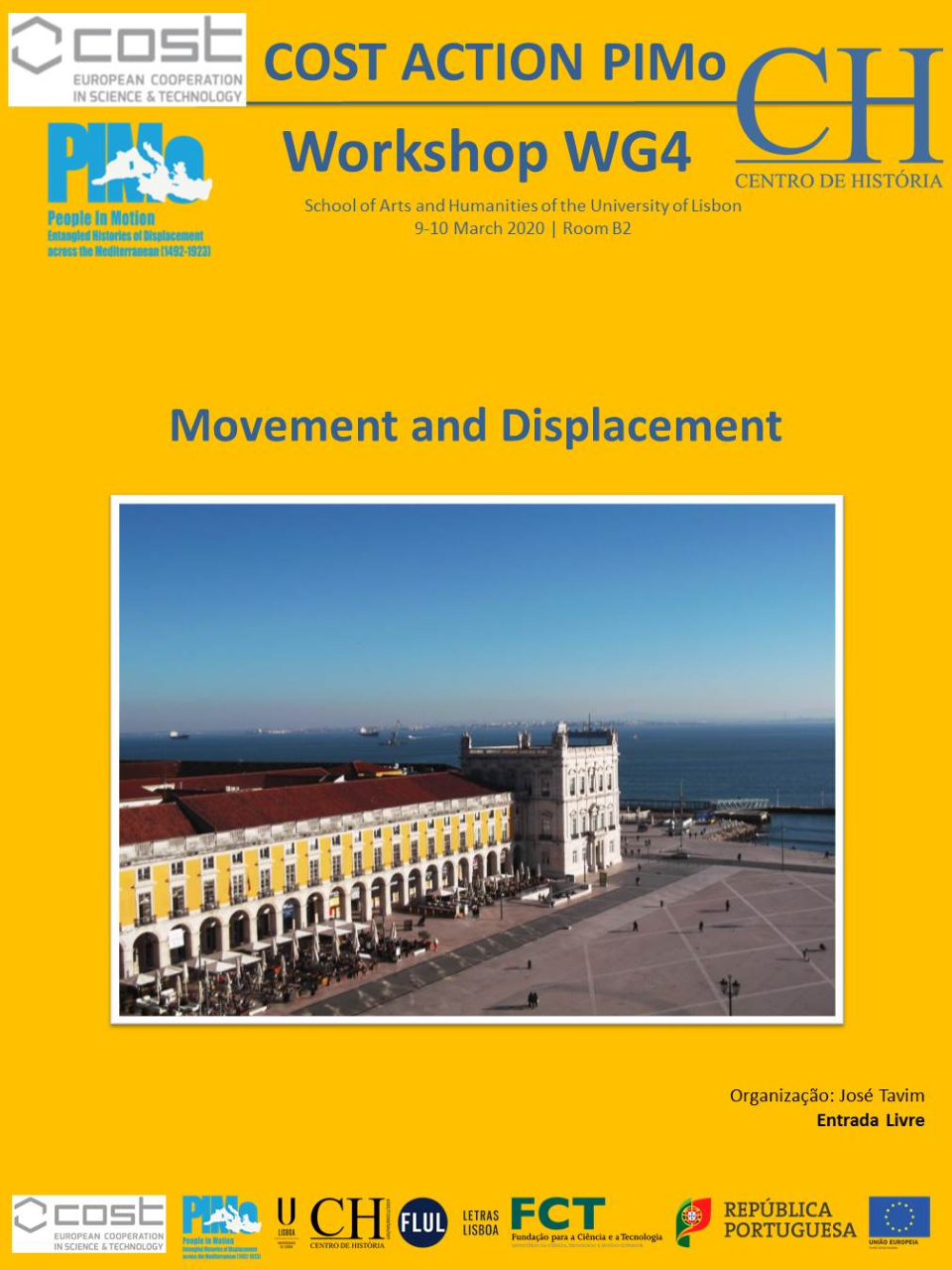Lista histport
Mensagem

[Histport] COST ACTION PIMo | Workshop Working Group 4 (People) Movement and Displacement | 09-10.3.2020 |
|
CA18140 - People in Motion: Entangled Histories of Displacement across the Mediterranean (1492-1923)
COST
ACTION PIMo | Workshop Working Group 4 (People) Movement and Displacement | 09-10.3.2020 |
Faculdade de Letras, Universidade de Lisboa,
9-10.3.2020,
Rooms B1 e B2
The questions that we will look to answer in Lisbon include:
1) Who are the people moving? 2) What are the drivers and circumstances of human movement, beyond the binary of voluntary and involuntary? How do we historicise these? 3) What influence do historical conditions (regime, political,
expulsion, persecution, and dynastic change; climate change and catastrophic natural disasters; food insecurity, personal safety; employment and economic opportunity) in the determination and/or conditioning of human movement?
4) What are the ‘positive’ contingencies for human movement like exploration and its powerful motivations of curiosity, wonder, and pleasure; trade; love and marriage, family, friendship, and global-transnational bonds.
As questões a que se procura responder neste workshop são:
Mais informações em:
Program 9 March 17.30 Welcome, Director of the Center for History,Professor Luís Filipe Barreto Open session and keynote address
Mediterranean Migrations and Entrepreneurial Diasporas, 15th-19th Centuries: An Overview Gelina Harlaftis, Institute of Mediterranean Studies, Crete 10 March 9.00-11.00: Session 1 Moors and Moriscos between Morocco and Portugal (16th century): Mobility, interaction and identity Filomena Barros, University of Évora Between Welfare and Vagrancy: The Regulation of Migration and Assistance to the Poor Among the Men of the Nation Hugo Martins, University of Lisbon Invisible People: Muslims in 18th-Century Trieste, Vienna and Beyond David do Paço, Sciences Po, CHSP A Regional Outreach: Movement and Entrepreneurial Networks in the Eastern Mediterranean Katerina Galani, Institute for Mediterranean Studies, Crete 11.00-11.30: Coffee Break 11.30-13.30: Mind Mapping Knowledge WG4 (part 1): divide participants onto groups of max 4 with a two way tool box: conceptualization + methodology
13.30-14.30: Lunch 14.30-16.00: Session 2 Violent Migrations of Albanians from the Territories of the Former Yugoslavia Hiriet Ziberi, Department of History, University of Tetova Family Networks, Isomorphism and Migration Dynamics. The Chrestou and Pavlou (Pavli) Families from Gjirokastra (S. Albania) (18th-19th c.) Konstantinos Giakoumis, POLIS University – Tirana
The Conceptualization of the Migration Crisis in Public Discourse Nihada Delibegovic Dzanic and Tanja Pavlovic, University of Tuzla 16.00-16.30: Coffee Break 16.30-18.30: Mind Mapping Knowledge WG4 (part 2): divide participants onto groups of max 4 with a two way tool box: outputs and out-PiMO connections 18.30-19.30: Reporting Results Mind Mapping Exercise and Stream Line to Future Events 19.30: End Mind Mapping Sessions: All participants are invited to participate in the mind mapping sessions. Giovanni Tarantino, Katrina O’Laughlin, José Alberto Tavim, Cátia Antunes, Joanna Musiatewicz (joanna.musiatewicz@gmail.com),
Giedre Blazite (giedre@ces.lt ) and Donal Hassett. |
| Mensagem anterior por data: [Histport] CFP - História do direito e da justiça na época moderna: horizontes ultramarinos e reinóis | Próxima mensagem por data: [Histport] Pensar o Passado: Utopia ou Resignação!, por Lino Tavares Dias |
| Mensagem anterior por assunto: [Histport] Cortes de 1451-1456: novo volume | Próxima mensagem por assunto: [Histport] Cuidar dos vivos e enterrar os mortos: o Hospital Real de Todos-os-Santos no Terramoto de Lisboa | 22 Nov 2023 | 15h00 |
